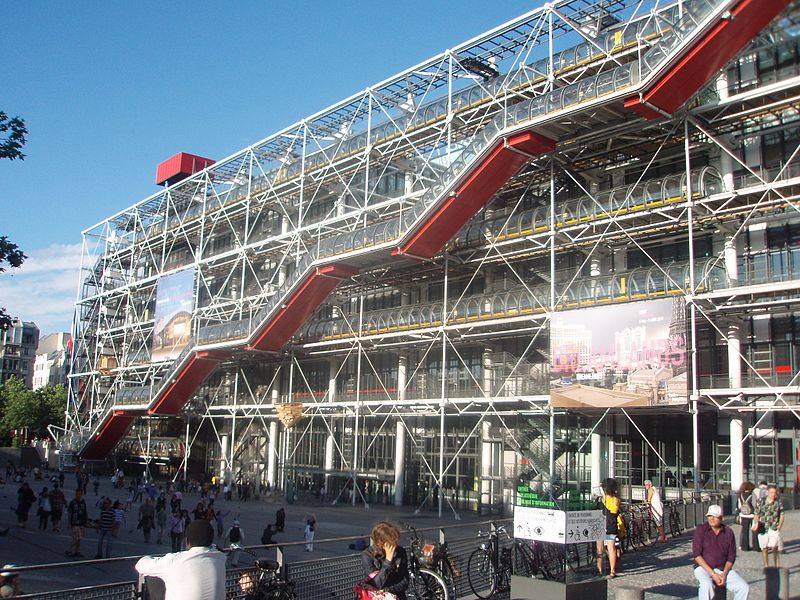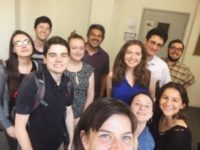Theory and Analysis of Contemporary Music: Study Abroad Course in Paris

UPDATE: We are sorry to announce that as of December 7, 2023 this program has been cancelled for Summer 2024, due to higher risks and costs related to the Paris 2024 Olympics. The program will return in 2025.
TH 402A
Theory and Analysis of Contemporary Music: Study Abroad Course in Paris
Robert Hasegawa, director
This summer study-abroad program is a four-week, three-credit graduate-level course on contemporary music, open to performers, composers, theorists, and other music scholars. Scheduled to coincide with ManiFeste-2024, a month-long festival of contemporary music produced by IRCAM (Institut de Recherche et Coordination Acoustique/Musique), the course is designed to explore musical innovations of the last twenty-five years with special emphasis on works performed during the festival. Students will attend class meetings with Prof. Robert Hasegawa for the first two weeks of the course, then will participate as auditors in the ManiFeste Festival Academy for the final two weeks. Academy events include concerts, lectures, masterclasses for composers and performers, open rehearsals, and films.
The course is repertoire-based, and will include readings by composers and theorists and close study of scores and recordings. Course topics will include spectralism, electroacoustic music, microtonality, computer-aided composition, extended serialism, and transformational theory.
The course is designed for graduate students and advanced undergraduates. Students applying to the course should have completed at least four semesters of collegiate-level music theory or the equivalent; previous study of post-tonal theory is recommended but not required. The course will be taught in English, and knowledge of French is not necessary.
The course will meet four days per week for three hours from May 27 to June 7, then for four additional meetings during the ManiFeste Academy (June 10–21). Class meetings will be supplemented by frequent concerts (usually fifteen to twenty performances), lectures, open rehearsals, and museum visits; students will also have free time to explore other Parisian musical and cultural resources. Housing in a single-occupancy dormitory room is included in the program fee.
Credit for the course can be transferred to most other North American colleges and universities—contact your institution’s registrar for details. For Eastman DMA students, this course fulfills the post-tonal theory (TH 402) degree requirement; those who have already taken TH 402 can still register for the course. Eastman students in other degree programs may apply the course as an elective toward the BM, BA, MM, MA, and PhD degrees.
The program fee of $6,310 includes student housing, concert tickets, course materials, local transportation passes, and travel/health insurance. Students will be responsible for all other expenses, including meals and airfare. Students who prefer to arrange their own housing will pay $5,910 (Eastman’s standard tuition for a three-credit course).



FACULTY
Music theorist and composer Robert Hasegawa has taught at Harvard University, the Eastman School of Music, and the Schulich School of Music of McGill University, where he is an Associate Professor of Music Theory and William Dawson Scholar. His interests include microtonality and just intonation, the French “spectralist” composers Gérard Grisey and Tristan Murail, David Lewin’s transformational theory, and analysis of orchestration and timbre. His dissertation, “Just Intervals and Tone Representation in Contemporary Music,” explores how research on the psychology of aural perception can inform the analysis of music by composers ranging from Debussy to La Monte Young. Robert’s article “Clashing Harmonic Systems in Haas’s Blumenstück and in vain” received the 2016 Emerging Scholar Award from the Society for Music Theory. Other recent projects include a special issue of Contemporary Music Review on American composer James Tenney, journal articles on music by Gérard Grisey, Georg Friedrich Haas, and Harry Partch, an encyclopedia entry on atonal theory for the New Grove Dictionary of Music and Musicians, a chapter on extended just intonation for the book Théories de la composition musicale au XXe siècle, and translations of essays by Tristan Murail.
Tuition:
$6,310 / 3 credits, including housing
$5,910 / 3 credits (no housing)
“TH402 Paris is an engaging, interesting and, most importantly, fun course! It’s perfect for students who want to learn more about contemporary music as well as be adequately challenged in their studies, and Paris is the perfect city to dive into this subject. This course makes for a life-changing learning experience by balancing exploration, academic work, and musical activities and events. Though the course subject matter is advanced, anyone who is interested in learning more about contemporary music will be welcomed with open arms, not just by the class and professor, but by the city itself. Any student wishing to make life-long friends, have an unforgettable study-abroad experience, and be surrounded by contemporary art, music and knowledge will surely find a home in this course!” — 2023 student
“I highly recommend this course for anyone who is seeking to enrich their musical career – whether as a performer, composer, or scholar of music. I have already given glowing reports to numerous friends and colleagues, encouraging current students to consider taking this course. It has inspired me to seek out other study-abroad opportunities at my institution. If you love traveling, sight-seeing, and meeting new people, all while immersing yourself in a wealth of innovative new music and inspiring ideas, this course is a perfect match for you!” — 2023 student
“This class was, quite literally, a life-changing experience for me. The course work was interesting and challenging, the concerts were amazing, and the experience at the IRCAM Academy was a once-in-a-lifetime opportunity that will resonate with me forever. Taking the opportunity to be completely immersed in the music with guidance from Dr. Hasegawa, and experiencing Parisian arts culture and the world of new music in France for a month was absolutely incredible!” – 2022 student
Read our blog: Summer@Eastman Spotlight: Theory and Analysis of Contemporary Music (Study Abroad Course in Paris)
